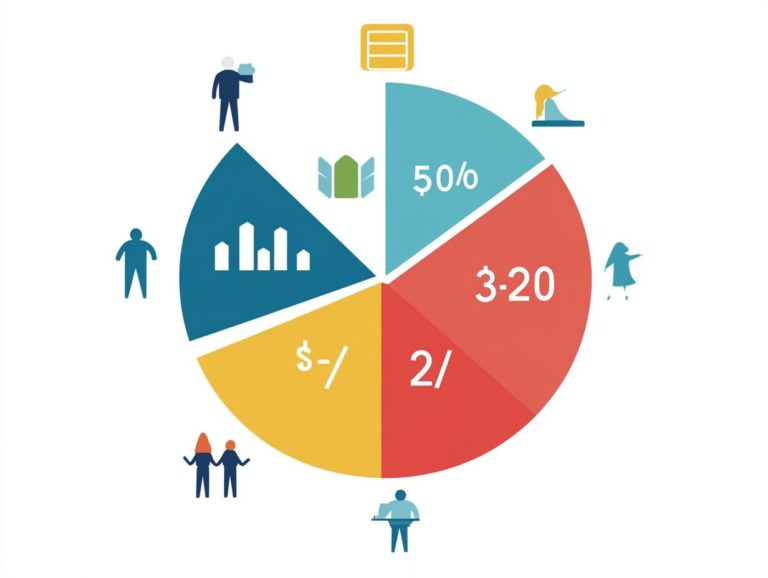How Can Family Members Get Involved in Budgeting?
Budgeting is more than just numbers; it stands as a crucial practice for families seeking financial stability and shared aspirations.
This discussion delves into how each family member can engage meaningfully in the budgeting process, from defining their roles to establishing collective financial goals.
It offers practical tools and strategies, tackles common challenges, and illuminates the advantages of collaboration.
By nurturing open communication and teamwork, budgeting can elevate your family s financial journey into a collaborative and enriching experience.
Contents
- Key Takeaways:
- Ways for Family Members to Get Involved
- Benefits of Family Involvement in Budgeting
- Frequently Asked Questions
- How Can Family Members Get Involved in Budgeting?
- Why is it important for family members to be involved in budgeting?
- How can I get my children involved in budgeting?
- What if my spouse is not interested in budgeting?
- How can we involve everyone in decision-making when it comes to budgeting?
- What if there are disagreements about budgeting within the family?
- How can we make budgeting more fun and engaging for the whole family?
Key Takeaways:

- Include everyone in budgeting to boost teamwork and communication.
- Utilize budgeting tools and strategies, like apps and software, to streamline the process.
- Address challenges and conflicts by identifying roles, setting financial goals, and learning to compromise as a family.
Why Budgeting is Important for Families
Budgeting is a game-changer for your family! It empowers you to manage finances effectively, plan for future needs, and ultimately achieve your financial goals.
By creating a family budget, everyone can track monthly expenses, identify spending habits, and allocate resources for essentials like groceries and utilities, while also saving for emergencies.
Effective budgeting reduces stress and prevents debt accumulation, ensuring that all family members, including children and spouses, grasp the importance of understanding and managing money wisely.
Not only does budgeting help you cut unnecessary costs, but it also plays a crucial role in setting financial priorities that align with your family’s long-term aspirations, such as buying a home or funding education.
Research from the American Psychological Association indicates that families who stick to a structured budget experience 20% less financial stress than those who don t.
Teaching your children about budgeting encourages them to develop money management skills early on, preparing them for a future of informed financial decision-making.
Cultivating a budget fosters an environment of transparency, empowering your family to work together toward collective financial well-being.
Ways for Family Members to Get Involved
Engaging your family members in the budgeting process is essential for creating a collaborative financial atmosphere, and you can learn how to make saving money a family affair.
When everyone understands their roles and responsibilities in managing the family budget, it fosters a sense of shared ownership and accountability.
By including everyone from children to spouses and even extended family you ensure that each person contributes to the family s financial goals and helps them grasp the importance of tracking expenses.
This involvement cultivates money management skills that will serve them well throughout their lives.
Identifying Roles and Responsibilities
Identifying roles within your family is a crucial step in crafting a successful budget. It ensures that everyone understands their part in achieving your financial goals.
By assigning specific tasks like tracking monthly expenses, managing savings, and monitoring spending habits family members can work together more effectively to reach shared objectives.
To assess each member s strengths and weaknesses, reflect on their interests and past experiences. For instance, if someone in your family has a talent for organization, they might excel at tracking expenses, while another with a flair for numbers could take charge of the budgeting spreadsheet.
If one person shines at researching deals, they could be entrusted with the task of scouting savings opportunities.
By aligning roles with personal strengths, families not only boost efficiency but also foster a supportive environment that nurtures individual growth. This strategic alignment ultimately brings the family closer to achieving its overall financial aspirations.
Setting Financial Goals as a Family
Setting financial goals as a family is a proactive way for you to manage your budget. It creates a shared vision for savings and spending that aligns with everyone’s needs and desires. By discussing aspirations like saving for vacations, reducing credit card debt, or building an emergency fund you can establish clear objectives that keep the entire family focused and committed to your financial plan.
In this process, it s essential to prioritize these goals together, ensuring that each family member’s input is valued. Engaging in open discussions allows for a transparent evaluation of various goals and desires.
As life circumstances change whether it’s job transitions, educational expenses, or unexpected emergencies you should revisit your financial objectives regularly. Adjusting them as necessary keeps them realistic and achievable. This dynamic approach fosters a sense of ownership and accountability, empowering everyone to contribute to the family s financial well-being while maintaining motivation and flexibility.
Tools and Strategies for Family Budgeting

Using effective tools and strategies for family budgeting can greatly simplify tracking expenses and managing monthly income. This ultimately steers you toward successful financial outcomes.
By incorporating budgeting apps like EveryDollar or using spreadsheets, you can efficiently categorize your expenses, manage your savings, and visualize your financial goals.
This helps everyone manage money better, ensuring everyone is on the same page regarding your financial journey.
Using Budgeting Apps and Software
Budgeting apps and software, such as EveryDollar, are essential tools that empower you to track expenses in real-time and manage your budget effortlessly. With these applications, you can easily categorize your spending, set financial goals, and receive alerts for any overspending, allowing you to adjust your budget as needed.
These platforms typically boast user-friendly interfaces that make the budgeting process straightforward, even for those who may not be well-versed in traditional financial management. Customization options enable you to tailor your budget to fit your unique needs, fostering a sense of ownership and responsibility in your financial journey.
These apps can also strengthen family bonds by promoting transparency and encouraging open discussions about finances, enhancing accountability. When everyone can view the budget and participate in conversations, it cultivates a more engaged atmosphere, ensuring that all members are aligned on financial goals and motivated to achieve them together.
Creating a Budgeting Plan and Sticking to It
Creating a budgeting plan is your ticket to financial success! It is essential for you and your family to track expenses and achieve financial goals. This plan acts as a roadmap for responsible spending and saving. A well-structured plan outlines your income sources, fixed and variable expenses, and savings goals, ensuring that everyone is on the same page in your financial journey.
To start crafting this vital plan, assess your total income, which may include wages, bonuses, and any other revenue sources. Next, compile a detailed list of all your expenses, categorizing them into necessities (regular bills like rent), discretionary spending, and savings contributions. Once you ve laid out all the financial details, allocate funds according to your priorities, making sure essential needs are met first.
It s crucial to schedule regular reviews of your budgeting plan, allowing you to adjust for any changes in income or expenses. This way, you can keep your financial strategy aligned with your evolving needs and goals.
Addressing Challenges and Conflicts
Addressing challenges and conflicts in family budgeting is crucial for maintaining harmony and achieving your financial objectives. Disagreements over spending and financial priorities can create unnecessary tension.
By proactively managing these conflicts and developing strategies to handle unexpected expenses, you can ensure that your family stays united in the pursuit of financial stability.
Handling Disagreements and Compromising
Open communication is key. By understanding each family member’s perspective, you can create a budget that meets everyone’s needs. A collaborative approach is essential, where a willingness to compromise paves the way for effective money management.
Establishing regular family meetings serves as an excellent platform for everyone to voice their concerns and propose solutions. Involving a neutral mediator like an impartial family member or a trusted friend can guide discussions and focus everyone on shared goals.
Compromise is essential in resolving conflicts; each person may need to adjust their expectations to reach a mutually beneficial agreement. Crafting a fair budget requires identifying competing interests and prioritizing collective needs. This inclusive method strengthens family bonds and nurtures a sense of responsibility toward financial goals.
Dealing with Unexpected Expenses

Unexpected expenses can really challenge your family budget! Unplanned costs can easily jeopardize your financial goals and throw your monthly spending plans into disarray. Establishing an emergency fund is vital; it serves as a cushion against these surprises, allowing you to address financial hiccups without derailing your entire budget.
To prepare for such scenarios, consider saving at least three to six months worth of living expenses in a dedicated savings account. Common unexpected costs might include:
- Medical emergencies
- Car repairs
- Surprise home maintenance issues
Adjusting your budget to accommodate these potential expenses may involve reviewing non-essential expenses, like eating out or entertainment, and reallocating those funds toward your emergency savings. By adopting a flexible mindset in your budgeting approach, you can pivot and accommodate unforeseen expenses while still fulfilling your essential financial commitments.
Benefits of Family Involvement in Budgeting
Family involvement in budgeting brings many benefits. It sparks communication, boosts teamwork, and nurtures a sense of financial responsibility among all family members.
When everyone engages in the budgeting process, it creates an atmosphere of transparency and trust. This collaborative effort allows families to unite in pursuit of common financial goals while imparting invaluable life skills to children.
Improved Communication and Teamwork
Involving everyone in budgeting boosts communication and teamwork. This approach establishes a common understanding and shared responsibilities. When you discuss your financial situation with your family, you foster collaboration and strengthen your collective commitment to achieving financial goals.
Regular budgeting meetings can transform family interactions. What might seem like a mundane task can become a valuable bonding opportunity. Using visual tools like budgeting apps or whiteboards to map out income and expenses makes discussions more interactive and inclusive.
Consider implementing game-like elements, such as setting savings challenges or rewarding milestones, to enhance motivation and unity. These strategies ensure everyone is on the same page and build trust and shared accountability. How often do you discuss finances with your family? Engaging in this financial journey together can make a significant difference!
Teaching Financial Responsibility to Children
Teaching financial responsibility to children through family budgeting is crucial for helping them build financial literacy and independence. By involving them in the budgeting process, you equip your kids with essential skills like tracking expenses, saving for future needs, and understanding the importance of money.
When you introduce concepts such as setting spending limits or distinguishing between wants and needs, your children learn practical strategies they can carry into adulthood. Engage them in discussions about household expenses to create an atmosphere of teamwork and shared responsibility.
They might even suggest small contributions toward family outings or special purchases, teaching them the importance of collaboratively managing resources.
Instilling these values early on not only cultivates well-considered choices but also builds their confidence, preparing them for the financial challenges they will face later in life.
Frequently Asked Questions
How Can Family Members Get Involved in Budgeting?

Getting the whole family involved in budgeting is a great way to promote financial responsibility and accountability. Here are some benefits of budgeting for families and how family members can get involved in budgeting.
Why is it important for family members to be involved in budgeting?
Getting your family involved in budgeting shows them just how valuable money can be! It creates transparency and helps everyone understand where the family’s money is going.
How can I get my children involved in budgeting?
Start by explaining budgeting in a simple way. Then, give them small tasks, such as tracking expenses or creating a budget for their allowance. This will help them learn budgeting skills and feel more invested in the family’s financial goals.
What if my spouse is not interested in budgeting?
Communication is key in this situation. Explain the benefits of budgeting and how it can help the family achieve their financial goals. Suggest starting with small steps, like tracking expenses, to get them more comfortable with the idea.
How can we involve everyone in decision-making when it comes to budgeting?
Schedule regular family budget meetings where everyone can discuss their needs and wants. This will help everyone feel included in the decision-making process and ensure that the budget reflects the family’s priorities.
What if there are disagreements about budgeting within the family?
It’s natural for there to be disagreements about budgeting. In this case, listen to each family member’s perspective and find a compromise that works for everyone. Remember, the goal is to work together towards the family’s financial success.
How can we make budgeting more fun and engaging for the whole family?
Get creative! Turn budgeting into a game, set rewards for meeting financial goals, or involve the whole family in finding ways to save money. Making budgeting a family activity can also make it more enjoyable for everyone.






